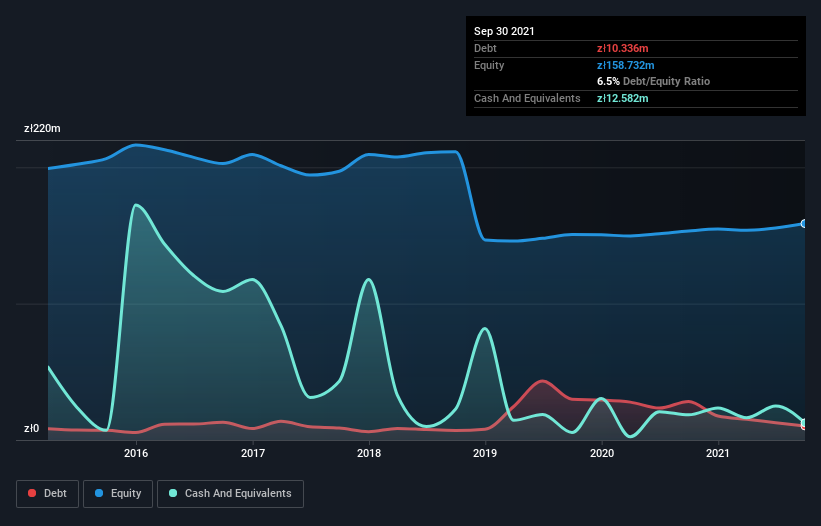
The external fund manager backed by Berkshire Hathaway's Charlie Munger, Li Lu, makes no bones about it when he says 'The biggest investment risk is not the volatility of prices, but whether you will suffer a permanent loss of capital.' It's only natural to consider a company's balance sheet when you examine how risky it is, since debt is often involved when a business collapses. We note that ZUE S.A. (WSE:ZUE) does have debt on its balance sheet. But is this debt a concern to shareholders?
When Is Debt Dangerous?
Generally speaking, debt only becomes a real problem when a company can't easily pay it off, either by raising capital or with its own cash flow. Ultimately, if the company can't fulfill its legal obligations to repay debt, shareholders could walk away with nothing. However, a more usual (but still expensive) situation is where a company must dilute shareholders at a cheap share price simply to get debt under control. By replacing dilution, though, debt can be an extremely good tool for businesses that need capital to invest in growth at high rates of return. When we think about a company's use of debt, we first look at cash and debt together.
Check out our latest analysis for ZUE
What Is ZUE's Debt?
The image below, which you can click on for greater detail, shows that ZUE had debt of zł10.3m at the end of September 2021, a reduction from zł28.2m over a year. However, its balance sheet shows it holds zł12.6m in cash, so it actually has zł2.25m net cash.

How Healthy Is ZUE's Balance Sheet?
According to the last reported balance sheet, ZUE had liabilities of zł320.7m due within 12 months, and liabilities of zł54.2m due beyond 12 months. On the other hand, it had cash of zł12.6m and zł301.9m worth of receivables due within a year. So it has liabilities totalling zł60.4m more than its cash and near-term receivables, combined.
This deficit is considerable relative to its market capitalization of zł67.2m, so it does suggest shareholders should keep an eye on ZUE's use of debt. Should its lenders demand that it shore up the balance sheet, shareholders would likely face severe dilution. While it does have liabilities worth noting, ZUE also has more cash than debt, so we're pretty confident it can manage its debt safely.
On top of that, ZUE grew its EBIT by 88% over the last twelve months, and that growth will make it easier to handle its debt. The balance sheet is clearly the area to focus on when you are analysing debt. But it is ZUE's earnings that will influence how the balance sheet holds up in the future. So if you're keen to discover more about its earnings, it might be worth checking out this graph of its long term earnings trend.
But our final consideration is also important, because a company cannot pay debt with paper profits; it needs cold hard cash. ZUE may have net cash on the balance sheet, but it is still interesting to look at how well the business converts its earnings before interest and tax (EBIT) to free cash flow, because that will influence both its need for, and its capacity to manage debt. Over the last two years, ZUE actually produced more free cash flow than EBIT. That sort of strong cash conversion gets us as excited as the crowd when the beat drops at a Daft Punk concert.
Summing up
Although ZUE's balance sheet isn't particularly strong, due to the total liabilities, it is clearly positive to see that it has net cash of zł2.25m. The cherry on top was that in converted 249% of that EBIT to free cash flow, bringing in zł22m. So is ZUE's debt a risk? It doesn't seem so to us. When analysing debt levels, the balance sheet is the obvious place to start. But ultimately, every company can contain risks that exist outside of the balance sheet. To that end, you should be aware of the 1 warning sign we've spotted with ZUE .
At the end of the day, it's often better to focus on companies that are free from net debt. You can access our special list of such companies (all with a track record of profit growth). It's free.
Valuation is complex, but we're here to simplify it.
Discover if ZUE might be undervalued or overvalued with our detailed analysis, featuring fair value estimates, potential risks, dividends, insider trades, and its financial condition.
Access Free AnalysisHave feedback on this article? Concerned about the content? Get in touch with us directly. Alternatively, email editorial-team (at) simplywallst.com.
This article by Simply Wall St is general in nature. We provide commentary based on historical data and analyst forecasts only using an unbiased methodology and our articles are not intended to be financial advice. It does not constitute a recommendation to buy or sell any stock, and does not take account of your objectives, or your financial situation. We aim to bring you long-term focused analysis driven by fundamental data. Note that our analysis may not factor in the latest price-sensitive company announcements or qualitative material. Simply Wall St has no position in any stocks mentioned.
About WSE:ZUE
Adequate balance sheet low.
Market Insights
Community Narratives



